
|
|
| Porifera |
| Ctenophora |
| Cnidaria |
| Mollusca |
| Annelida |
| Arthropoda |
| Other Phyla |
| Chordata |
 |
|
|
 |
Common
Name(s):
Tompot Blenny Scientific Name: Parablennius gattorugine Family: Blennidae Usual Size: 20 cm to 156 g |
| Identification:
A medium-sized blenny, elongate small fish of a large family of fishes that live in rocky areas in shallow water. All true blennies have a continuous dorsal fin; the first dorsal fins are spiny and the remainder are soft. The pectoral finds are relatively large. Distinguished by a pair of tentacles/lappets over the eye.
 Photograph by Andy Horton
Photograph by Andy HortonSimilar species: Red Blenny, Parablennius ruber Coryphoblennius galerita, Lipophrys pholis (Smooth Blenny), Blennius ocellaris (Butterfly Blenny), Yarrell's Blenny, Chirolophis ascanii The presence of the eye tentacles are definitive. See link below. The first fin does not contain the ocellated spot of the Butterfly Blenny. Breeding: Spring Habitat: Rocky areas below low water mark, rarely intertidal where both similar species are to be found in the summer. Found on the shore at Dawlish, Devon, in winter only. Infrequent on the shore in Sussex (1 in 100 visits on favourable tides in spring and autumn). Food: Small invertebrates including sea anemones. Sharp comb-like teeth. Range: See map. The precise distribution around the Irish coast needs further research. Additional Notes: A common fish familiar to divers. Dorset Photographs:
5 August
2008
Report
from the Beechey Family
15
August 2007
Report
by
Rob & Dawn Watson
Diving
at Welbourne (Sunstar Sub-Aqua)
Tompot
Blennies off the Norfolk coast
The diver's that first saw the Tompot Blenny were Dawn and Rob, although there were at least eight people that saw it at the time. The biogeograhical distribution of the Tompot Blenny around Britain is currently under investigation. The books may just be wrong! They are found off the Sussex coast. More Information (Aquarium Study) Information wanted: Please
send any records of this fish, with location, date, who discovered it,
how it was identified, prevalence, common name and any other details to
Reports:
When Deanna tried to catch it, it attached itself firmly to her glove with its sharp teeth, and proved somewhat difficult to remove to the bucket! In the aquarium, however, the fish displays none of the usual aggressive tendencies of other Tompots, and will come out of its hole to be stroked when the tank is approached! Immediately after capturing one Tompot, I found another, much larger at over 30 cm in length, and similarly brightly coloured. Even more strangely, a couple of tiny fish (25 mm or so) that Deanna found under small stones also turned out to be baby Tompots once we had returned home, and they are delightful aquarium residents, bustling about the tank and perching on rocks to watch the other residents. by
Jon Makeham & Deanna Webb (Looe)
Differences between Blennies & Gobies Links: blennies.htm More Information http://www.mermaid1.demon.co.uk/creature01.htm |
| FIVE KINGDOMS TAXONOMIC INDEX TO BRITISH MARINE WILDLIFE |
|
|
|
|
|
News 2008 |
Membership Form |
|




